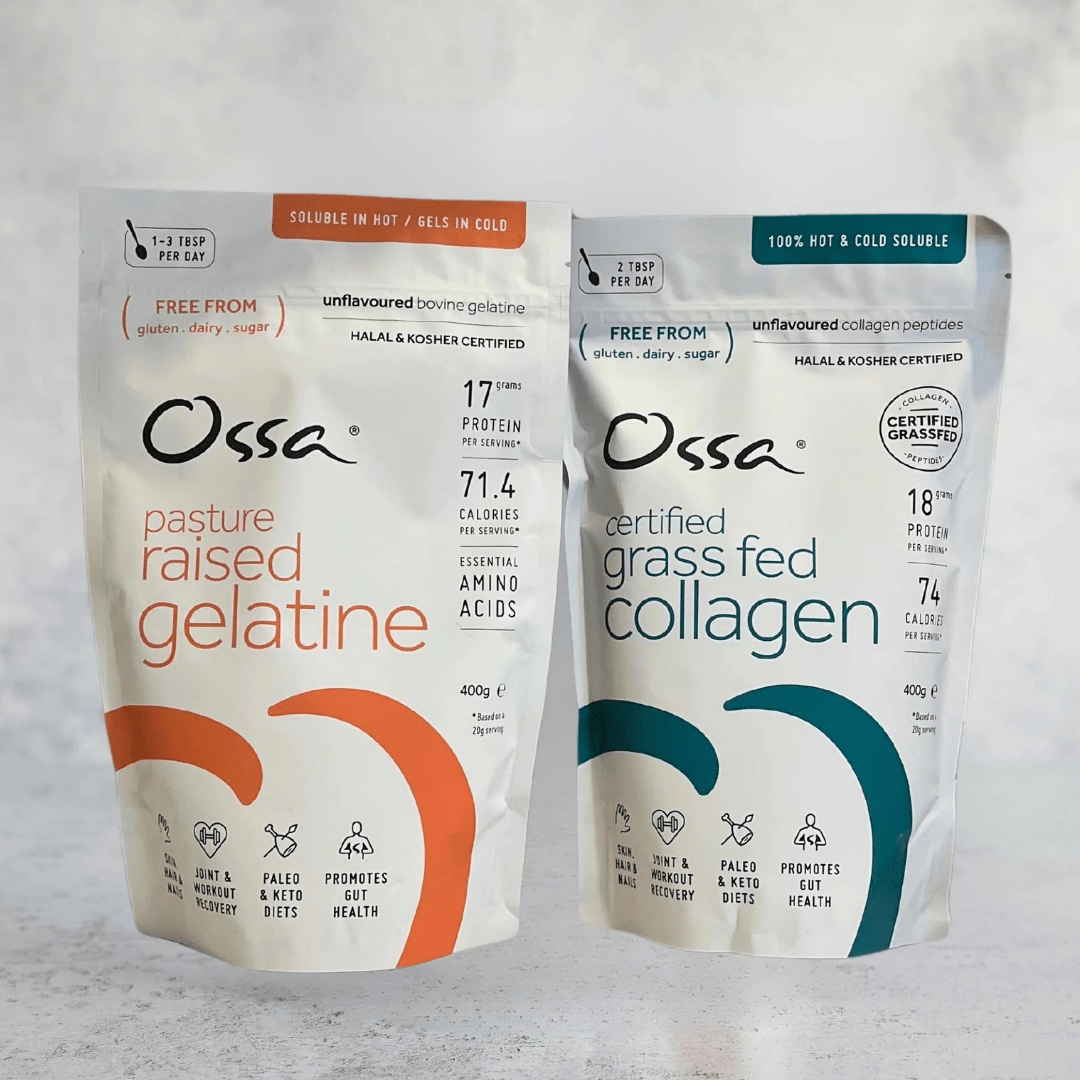When it comes to nourishing the body from the inside out, few nutrients compare to collagen and gelatine. At first glance, they may seem interchangeable—both support skin elasticity, joint mobility, and gut health—but these two proteins have distinct characteristics and benefits. At Ossa Organic, we believe in demystifying whole-food nutrition. In this blog, we’ll break down the difference between gelatine and collagen, how each supports your body, and why both deserve a place in your daily diet.
What Is Collagen?
Collagen is the most abundant protein in the body, accounting for nearly 30% of total protein content. It's found in skin, bones, muscles, tendons, ligaments, and the digestive tract, acting as the main structural protein that holds everything together.
There are several types of collagen, but the most relevant for health and wellness include:
-
Type I: Strengthens skin, bones, and tendons
-
Type II: Found in cartilage and joints
-
Type III: Supports skin, muscles, and organs
The body produces collagen naturally, but production slows with age. That’s why collagen supplements, particularly those sourced from real food, are so beneficial.
What Is Gelatine?
Gelatine is a cooked form of collagen. When bones and connective tissues are simmered during the preparation of bone broth, collagen breaks down into gelatine. Once cooled, this turns the broth into a jelly-like consistency.
While collagen peptides (often found in powdered collagen supplements) dissolve easily in cold or hot liquids, gelatine behaves differently—it thickens and gels, making it ideal for recipes like:
-
Gummies
-
Jelly desserts
-
Thickened sauces or soups
-
Baked goods
Despite their differences, gelatine and collagen share similar amino acid profiles, particularly rich in glycine, proline, and glutamine, all of which support cellular repair, skin elasticity, and gut healing.
Key Differences Between Gelatine and Collagen
|
Feature |
Collagen |
Gelatine |
|
Source |
Raw connective tissue |
Cooked collagen from animal tissue |
|
Texture |
Dissolves in any liquid |
Thickens and gels when cooled |
|
Digestibility |
Highly digestible |
Slightly slower digestion |
|
Culinary use |
Smoothies, drinks, soups |
Gummies, desserts, thickened recipes |
|
Health benefits |
Skin, joints, gut |
Skin, joints, gut |
The Health Benefits of Collagen
Collagen is vital for maintaining the structure and integrity of the body. Regular intake—especially from food-based sources—supports:
-
Skin elasticity: Helps minimise fine lines and wrinkles
-
Joint strength: Supports cartilage and reduces joint discomfort
-
Gut integrity: Helps heal leaky gut and soothes the digestive tract
Ossa’s collagen provides this powerhouse protein in its most natural and bioavailable form.
The Health Benefits of Gelatine
Gelatine offers many of the same benefits as collagen, with the added culinary versatility to create texture-rich recipes. It’s particularly effective for:
-
Gut repair: Forms a protective barrier in the gut lining
-
Sleep support: Glycine has been shown to improve sleep quality
-
Skin hydration: Supports dermal structure and moisture retention
Ossa Organic Gelatine is made using traditional slow-cooking methods to extract the full spectrum of nutrients from organic bones.
Why You Need Both Collagen and Gelatine
While both collagen and gelatine originate from the same source—animal connective tissue—they function slightly differently in the body and in the kitchen. By incorporating both into your diet, you ensure that you’re supporting your body with a diverse range of benefits:
-
Collagen supplements are ideal for those looking to improve skin health and joint function, especially when added to hot drinks, smoothies, or soups.
-
Gelatine is perfect for creating nourishing snacks and meals that aid digestion and provide lasting satiety.
Combining both helps support collagen synthesis from multiple angles, enhancing your results.
How Ossa Organic Sources Collagen and Gelatine
At Ossa Organic, we’re deeply committed to quality. Our collagen and gelatine are made from grass-fed, ethically sourced bones, prepared using traditional methods that prioritise nutrient preservation.
Our sourcing principles:
-
Grass-fed, organic livestock
-
No artificial preservatives or additives
-
Slow cooking over 24–48 hours to maximise collagen and mineral extraction
By focusing on food-first principles, we offer collagen supplements that are effective, sustainable, and grounded in ancestral nutrition.
How to Use Collagen and Gelatine in Your Routine
Adding these nutritional powerhouses into your daily routine is easy and rewarding:
-
Drink as a warming cup in the morning
-
Add to soups, stews, or sauces
-
Use in grains or risottos instead of water
-
Make gut-healing gummies or jelly desserts
-
Add to bone broth to thicken consistency
-
Include in hot teas or tonics before bedtime
Can You Take Too Much?
Both collagen and gelatine are generally well-tolerated, especially when sourced from whole foods. However, moderation and balance are key. A cup or two of collagen bone broth a day, plus occasional gelatine-based treats or recipes, is sufficient for most people to see lasting benefits.
If you have allergies, specific health conditions, or are pregnant, consult your practitioner before making dietary changes.
Collagen and Gelatine as Everyday Essentials
While the supplement market is flooded with isolated powders, pills, and synthetic options, we believe that the most effective collagen support comes from whole, traditional foods. That’s why our focus at Ossa Organic is on delivering bone broth and gelatine that nourish your body the way nature intended.
By understanding the difference between gelatine and collagen, and using both intentionally, you can unlock profound benefits for your skin, joints, digestion, and overall wellness.
Make them a part of your everyday skincare and nutrition routine—your body will thank you.





